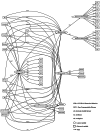Do Electronic Health Literacy and Online Health Information-Seeking Behavior Mediate the Effects of Socio-Demographic Factors on COVID-19- and Non-communicable Disease-Related Behaviors Among Myanmar Migrants in Southern Thailand?
- PMID: 38125220
- PMCID: PMC10731563
- DOI: 10.7759/cureus.49090
Do Electronic Health Literacy and Online Health Information-Seeking Behavior Mediate the Effects of Socio-Demographic Factors on COVID-19- and Non-communicable Disease-Related Behaviors Among Myanmar Migrants in Southern Thailand?
Abstract
Introduction Myanmar migrants in Thailand are vulnerable to COVID-19 and non-communicable disease (NCD) risk behaviors, influenced by socio-demographic factors. In the digital age, migrants can seek extensive health information online, and their ability to understand and use electronic health information, which is known as electronic health literacy (e-Health literacy), becomes critical in making decisions about their health behaviors. This study aims to investigate the potential mediating roles of online health information-seeking and e-Health literacy in the associations between socio-demographic factors and COVID-19- and NCD-related behaviors. Methods Our study was conducted in 2022, involving 1,050 Myanmar migrants in two southern Thai cities. Data on socio-demographic factors, e-Health literacy, online health information seeking, COVID-19-related behaviors (adherence to COVID-19 protective behavior (CPB), vaccination), and NCD risk behaviors (smoking, betel chewing, alcohol consumption, substance abuse) were collected. Structural equation modeling (SEM) was employed to analyze the hypothesized relationships. Results Nearly all migrants received the COVID-19 vaccination in two doses and above, with reasonable good adherence to CPB. Migrants exhibited risky NCD-related behaviors, including current smoking (26.8%), alcohol consumption (17.5%), and betel chewing (25.8%). Approximately three-quarters (73.4%) had a limited e-Health literacy level, and the vast majority did not search for online health information. Their COVID-19- and NCD-related behaviors were directly influenced by socio-demographic factors without the significant mediation roles of e-Health literacy and online health information seeking. Conclusions Myanmar migrant workers in Southern Thailand had reasonably good practices in COVID-19-related behaviors despite engaging in risky NCD-related behaviors. These outcome behaviors were directly influenced by their socio-demographic factors, without the significant mediation roles of e-Health literacy and online health information seeking. The findings suggest that diverse interventions beyond e-Health strategies for future pandemic mitigation and enhancement of their health behaviors are needed.
Keywords: covid-19; electronic health literacy; myanmar migrants; non-communicable disease; online health information-seeking; socio-demographic factors.
Copyright © 2023, Htet et al.
Conflict of interest statement
The authors have declared that no competing interests exist.
Figures


Similar articles
-
Association between Thai language proficiency and adherence to COVID-19 protective behaviors (CPB) among Myanmar migrant workers in Southern Thailand.PLoS One. 2024 Oct 25;19(10):e0312571. doi: 10.1371/journal.pone.0312571. eCollection 2024. PLoS One. 2024. PMID: 39453945 Free PMC article.
-
Perspectives of stakeholders on barriers to COVID-19 protective behaviors adherence and vaccination among Myanmar migrant workers in southern Thailand: A qualitative study.PLoS One. 2025 Mar 11;20(3):e0317714. doi: 10.1371/journal.pone.0317714. eCollection 2025. PLoS One. 2025. PMID: 40067860 Free PMC article.
-
Acculturation and Its Effects on Health Risk Behaviors among Myanmar Migrant Workers: A Cross-Sectional Survey in Chiang Mai, Northern Thailand.Int J Environ Res Public Health. 2020 Jul 15;17(14):5108. doi: 10.3390/ijerph17145108. Int J Environ Res Public Health. 2020. PMID: 32679842 Free PMC article.
-
Coronavirus disease 2019 information-seeking behavior globally: a systematic review.SAGE Open Med. 2023 Feb 18;11:20503121231153510. doi: 10.1177/20503121231153510. eCollection 2023. SAGE Open Med. 2023. PMID: 36815137 Free PMC article. Review.
-
Cardiovascular health care and health literacy among immigrants in Europe: a review of challenges and opportunities during the COVID-19 pandemic.Z Gesundh Wiss. 2022;30(5):1285-1291. doi: 10.1007/s10389-020-01405-w. Epub 2020 Oct 27. Z Gesundh Wiss. 2022. PMID: 33134037 Free PMC article. Review.
Cited by
-
The impact of electronic health literacy on emotional management ability among college students: the mediating roles of peer relationships and exercise self-efficacy.BMC Psychol. 2024 Dec 18;12(1):747. doi: 10.1186/s40359-024-02276-6. BMC Psychol. 2024. PMID: 39696508 Free PMC article.
-
Association between Thai language proficiency and adherence to COVID-19 protective behaviors (CPB) among Myanmar migrant workers in Southern Thailand.PLoS One. 2024 Oct 25;19(10):e0312571. doi: 10.1371/journal.pone.0312571. eCollection 2024. PLoS One. 2024. PMID: 39453945 Free PMC article.
References
-
- World Report on the Health of Refugees and Migrants. [ Jun; 2023 ]. 2022. https://apps.who.int/iris/rest/bitstreams/1451966/retrieve https://apps.who.int/iris/rest/bitstreams/1451966/retrieve
-
- Thailand Migration Report 2019. [ Apr; 2021 ]. 2019. https://thailand.un.org/en/50831-thailand-migration-report-2019 https://thailand.un.org/en/50831-thailand-migration-report-2019
-
- Impact of COVID-19 on Migrants in Thailand Situation Report. [ Nov; 2021 ]. 2021. https://thailand.iom.int/sites/thailand/files/COVID19Response/UNMNW%20CO... https://thailand.iom.int/sites/thailand/files/COVID19Response/UNMNW%20CO...
-
- COVID-19: impact on migrant workers and country response in Thailand. [ Mar; 2021 ]. 2020. http://www.ilo.org/asia/publications/issue-briefs/WCMS_741920/lang--en/i... http://www.ilo.org/asia/publications/issue-briefs/WCMS_741920/lang--en/i...
LinkOut - more resources
Full Text Sources
